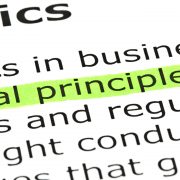A growing body of behavioral-science research indicates that believing life has meaning helps individuals thrive. People who view their decisions as existentially weighty cope better with stress and tragedy. They also live longer and healthier lives. Disbelief in meaning is a major risk factor for depression, substance abuse and suicide. But the idea that our actions are consequential has effects beyond psychology. Our research has found that a sense of life’s meaningfulness is tightly tied to positive views of capitalism and entrepreneurship.
As part of a new institute at our university—the Sheila and Robert Challey Institute for Global Innovation and Growth—we conducted a survey to investigate how the need for meaning relates to Americans’ beliefs about economic freedom and their entrepreneurial ambitions. We were interested in a specific motivational dimension of meaning, what we refer to as existential agency: the extent to which people believe they are capable of finding and maintaining meaning in life.
In our study, 1,269 American adults 18 to 88 completed questionnaires that assessed psychological characteristics (including existential agency), their general views on economic freedom, and the extent to which they believe capitalism can help solve large-scale challenges such as climate change, automation and poverty. They also responded to items assessing how much they believe entrepreneurship benefits society, as well as their own entrepreneurial motivation.
We found that existential agency is strongly associated with views about capitalism. The more people believe in their ability to live a meaningful life, the more they view capitalism and entrepreneurship as good for society. Among those who plan to start a business, existential agency strongly predicts how motivated they are to pursue their entrepreneurial goals.
Even accounting for income and employment status as well as other correlates of economic beliefs such as age and political ideology, the effects of existential agency remain statistically significant and strong. Existential agency has a unique effect on views about capitalism and entrepreneurship, as well as entrepreneurial motivation.
We believe these results make sense in light of previous experimental studies demonstrating that when people focus their attention on what gives them meaning, they feel more agentic, driven to pursue their goals, and optimistic about the future.
Champions of free markets regularly point out that capitalism has made life easier, safer and longer. This is true and worthy of celebration. But humanity is an existential species: People want more than safe and comfortable lives; they want their struggles to matter. The more Americans believe they can achieve a life of meaning, the more they will push for economic freedom and be inspired by the entrepreneurial spirit that has helped our nation flourish.
Mr. Routledge is a professor of management at North Dakota State University and Mr. Bitzan is the director of the Sheila and Robert Challey Institute for Global Innovation and Growth. This article first appeared in wsj.com













